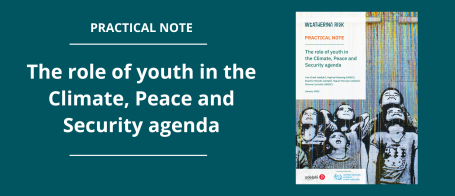The role of youth in the Climate, Peace and Security agenda
Read the full report here.
In many regions, young people are often the largest demographic group facing the interlinked challenges of climate change and conflict. They are also frequently at the forefront of innovative responses to tackle them – at the community, regional and global level. There is growing recognition of the importance of including youth in Climate, Peace and Security (CPS) policy and programming, but funding and support for youth-led initiatives remain limited.
In response to these challenges, adelphi research and the United Nations System Staff College (UNSSC) organised a workshop on the day before the Berlin Climate and Security Conference 2024, “From advocates to experts: An inter-generational exchange on the Climate, Peace and Security agenda.” The workshop aimed to identify concrete solutions and action points to ensure the meaningful engagement of youth in CPS policy and programming at all levels.
Youth engagement in the CPS agenda has faced significant challenges and has been notably lagging behind for several reasons, including:
- Lack of adequate and sustainable financial streams
- Physical risks and violence against young climate and peace activists
- Lack of trust
- Intergenerational injustices
- Language and representation barriers
- Literacy gaps in CPS issues
Despite that, some existing initiatives and programmes exemplify emerging good practices for youth inclusion in CPS programming and policy. Measures include:
- Recognising young people as experts and leaders in CPS
- Providing quality funding for local youth-led CPS initiatives in fragile contexts
- Gathering disaggregated data on young people’s views, concerns and needs
- Opening pathways for young experts into decision-making spaces
To ensure meaningful youth engagement, the narrative surrounding youth must be transformed. The workshop and this report draw on the lived experiences and expertise of young people, particularly those on the front lines of climate change and conflict. It becomes apparent that young people are not merely victims in vulnerable situations. Rather, they are active agents of change and innovation and bring fresh perspectives and solutions.
The report offers recommendations are for the UN system, member states, donors and CPS researchers and practitioners and identifies steps to strengthen and institutionalise youth-led contributions in the CPS agenda, including:
- Institutionalising and funding youth leadership in CPS
- Strengthening protection mechanisms for youth activists
- Increasing opportunities for capacity-building, learning exchanges and partnerships
- Supporting youth-led knowledge generation on CPS
Download the full report below.
Share on


